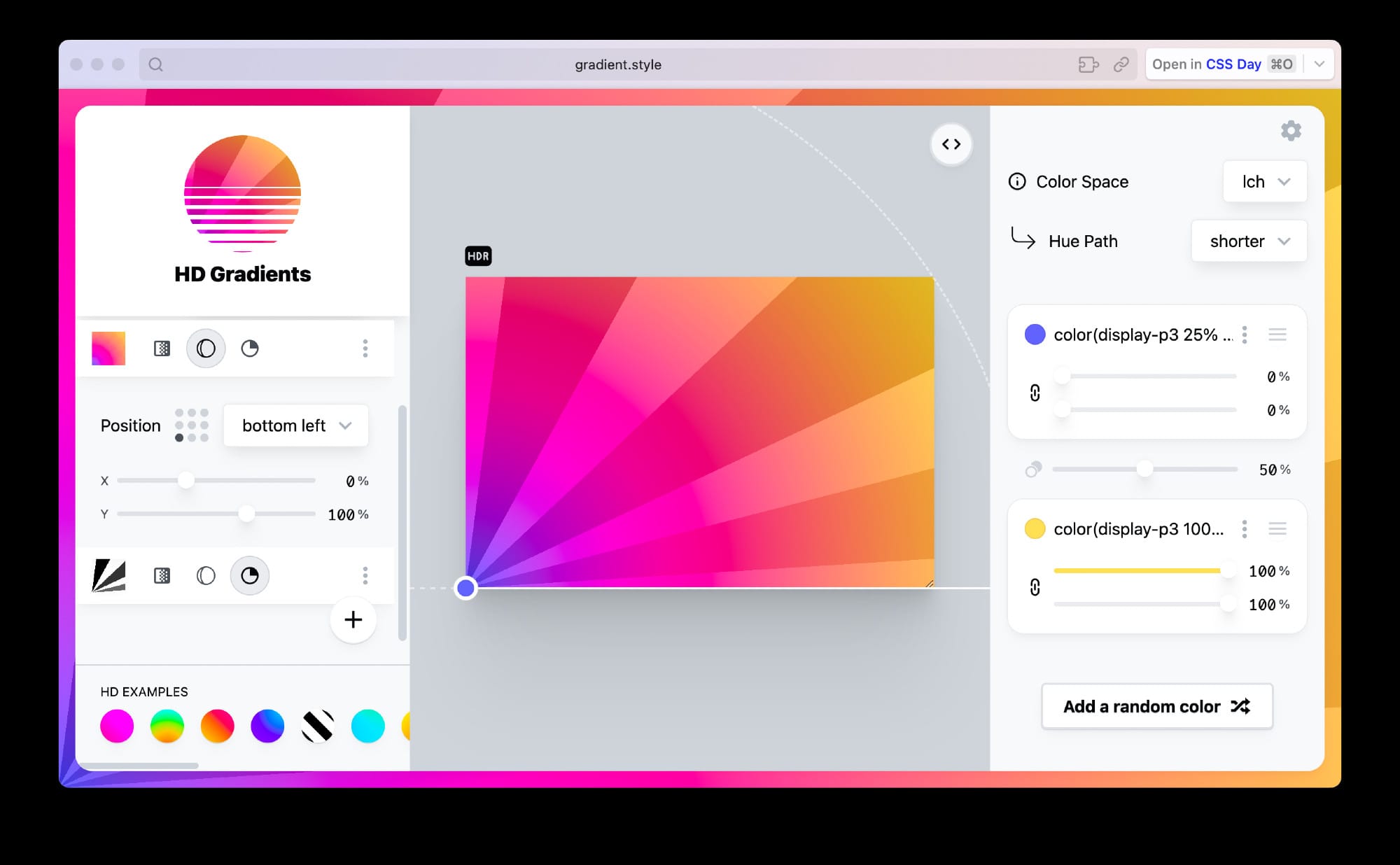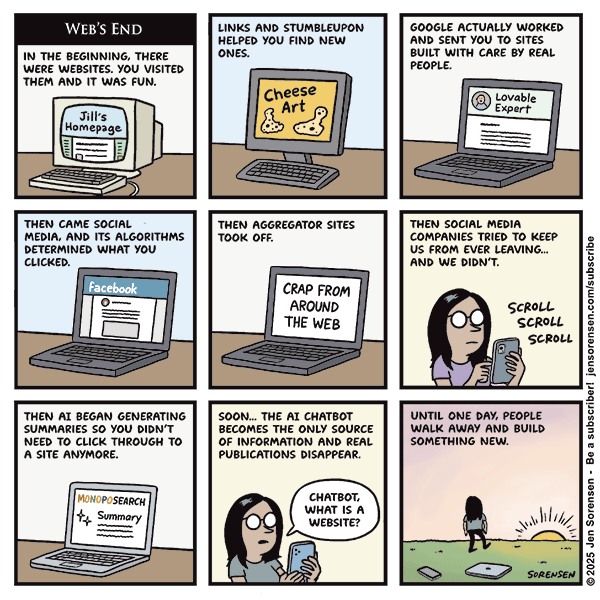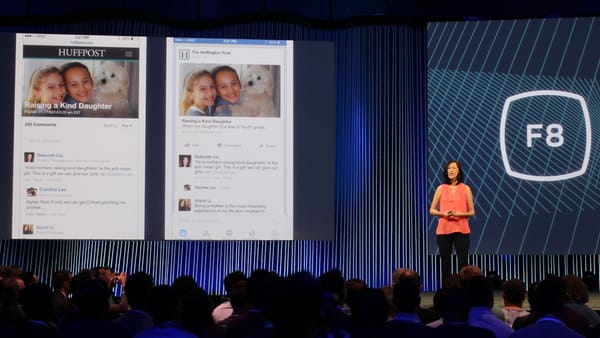WTN #4: The Fate of the Web in the AI Era
I've been pondering what the fate of the Web will be as we continue to progress into the AI era...
(For this issue of Web Technology News (WTN), my weekly newsletter tracking what's next on the web, I'm introducing a blog-like 'preamble' at the start. WTN is primarily a list of curated links at this point, but as Scott Rosenberg put it in an influential Salon article in May 1999, a weblog is "a window onto the mind and daily life of its creator." So I'm adding more of a window into my mind, specifically about the technology that has defined my career: the web.)
...so yes, I've been wondering if the web is going to survive the AI onslaught — to put it more plainly. On the technology side, I think the web will continue to be the default open platform for internet technology. You only need to look at the recent development of MCP-UI — which is bringing web UIs to AI agents — to see that the web will continue to power AI interfaces (MCP-UI will, in time, also add mobile platform hooks — but, crucially, it started with web). Also in my report on GPT-5 and its coding abilities, I noted that GPT-5 is very much focusing on web technologies and frameworks; I have a post coming soon that gets into GPT-5's relationship to frontend development more. I've also been encouraged to see the experiments with AI that browser engineers like Paul Kinlan have been doing. So I'm not worried about the fate of web technology in the AI era.
The fate of web content, though? Well, that's a different story. I worry that Google in particular, as a long-time web advocate, is starting to forget that the web is a human-powered network — and that it should remain that way. We know that co-founder and ex-CEO Larry Page has wanted Google to be AI-driven from as far back as 1999. So Google's move into AI Overviews and "AI Mode" makes sense, at least as a way to fulfil Page's dream. But what happens when Google's AI is giving out all the answers — what motivation will people like me have to contribute content to the web? Online advertising has already all but disappeared as a revenue source for bloggers and newsletter writers, and going forward there will be fewer and fewer incentives for web users to pay for content when AI will give it to them for free (even though it is based on human-created content that LLMs scraped off the web).
I don't have the answers to these thorny issues, but it's something I am tracking with a large dollop of concern.
Ok, let's check out the web tech news from this week.
Web Platform
- The “Should we remove XSLT from the web platform?” debate continues. Eric Meyer, developer advocate at Igalia, weighed in with a post that unequivocally states his view in the headline: No, Google Did Not Unilaterally Decide to Kill XSLT. He wrote that the decision whether or not to remove XSLT is far from certain: "It’s a first step in a multi-step evaluation process that can take years to complete, and whose outcome is not predetermined."
- Adam Argyle has released gradient.style out of beta, as an open source project. It offers multiple background editing.

- A new Python documentary dropped this week. One to watch across a couple of lunchbreaks.
- Typepad's current owner, a company called Newfold Digital, will be shutting down the service on September 30th.
- WordPress developer Matze on why React in the WordPress admin interface is a bad idea. He quotes fellow dev Glenton Samuals:
"A full React rewrite may look cutting-edge, but it threatens the broad community, the ecosystem, and WordPress’s future sustainability. Instead, modernizing via PHP + Interactivity API + modern CSS (including View Transitions) preserves backward compatibility, performance, and accessibility while delivering a polished, modern admin experience."
- Meta introduces a new REST API framework, adding that "By 2026, REST will become the default for all new APIs across Meta."
Open Social Web
- Bounce, a migration tool for the open social web, has officially launched. As Sarah Perez reports:
"The cross-protocol migration tool offers a service that allows users of open social networks like Bluesky and Mastodon to move their follow graphs between their accounts, even though the networks rely on different underlying protocols."
- The science community is flocking to Bluesky, reports Ars Technica:
"...while Twitter was once the platform of choice for a majority of science communicators, those same people have since abandoned it in droves. And of the alternatives available, Bluesky seems to be their new platform of choice."
- Meanwhile, Blacksky founder Rudy Fraser explains how Blacksky "grew to millions of users without spending a dollar." Writes Rudy:
"Blacksky Algorithms’ work also functions as memory work — preserving the shared narratives and collective decision-making of the largest Black community on the decentralized web."
- Bluesky has decided to drop out of the Mississippi market. Ernie Smith writes that "while understandable, is a clear sign that we cannot take our digital access for granted."
- Emelia on Mastodon points out that the fediverse is not above the law either: "...we are not above the laws in which we operate, just because we're the fediverse. If someone wants to provide a service to residents in the UK, then yeah, you'd need to follow OSA for those users, or in other jurisdictions' age verification or content laws."
- Threads has released a "text attachment" feature that allows users to add a long glob of text to their microblogging posts. Clearly it's copying X/Twitter, but as Anuj Ahooja rightly warns, don't fall for it:
"This is just blogging, but worse. Platform-locked (no RSS, email, etc.) and drops open social web compatibility (even though receiving platforms can and do support long-form already).
FYI: Meta has tried long-form multiple times and shut down all of those projects. If you want to create long-form content, use real publishing products that provide versatile distribution tools."
- Quick promo for my Cybercultural post this week, which explores how blogs and RSS began in 1999. If you're an open web fan, I think you'll like it!
Web + AI
- Patrick Brosset, a product manager on the Edge team at Microsoft, introduces WebMCP: "a proposal to let you, web developers, control how AI agents interact with your web pages."
The Edge and Google teams have been working on this together and are looking for feedback. The project's GitHub page has a more specific description:
"We propose a new JavaScript interface that allows web developers to expose their web application functionality as "tools" - JavaScript functions with natural language descriptions and structured schemas that can be invoked by AI agents, browser assistants, and assistive technologies."
- Speaking of MCP, in my latest post on The New Stack about MCP-UI — an emerging protocol to insert web UIs into AI agents — I talked to two Shopify engineers about how they used MCP-UI to add web components to AI agents, as part of its "agentic commerce" rollout.
One of the Shopify engineers, Bret Little, admitted that "personally, I don’t think I’ve gotten to the point where I trust an agent to go buy stuff for me.” But, he added, “I think that is an amazing goal to shoot for, where we get to a point where people can trust agents to do important purchases for them. And I think Shopify is definitely trying to push in that direction.”
- Brave Browser, the browser company run by JavaScript's inventor Brendan Eich, has started "a series about security and privacy challenges in agentic browsers." Its first post focuses on Perplexity's Comet browser:
"The vulnerability we’re discussing in this post lies in how Comet processes webpage content: when users ask it to “Summarize this webpage,” Comet feeds a part of the webpage directly to its LLM without distinguishing between the user’s instructions and untrusted content from the webpage. This allows attackers to embed indirect prompt injection payloads that the AI will execute as commands."
- Cloudflare has announced it is combining an open standard (NLWeb) with its own infrastructure (AutoRAG) to "make your website conversational for people and agents." I have just had an interview with Cloudflare about this news, so expect a post on The New Stack next week about it.
- GitHub announced that "Copilot coding agent, our autonomous background agent, now supports AGENTS.md custom instructions."
One More Thing
This cartoon by Jen Sorensen captures the existential dread of the web tech community currently. Obviously, webheads the world over are working to make sure this bleak scenario doesn't happen...

Thanks for reading, and if you have any suggestions on news sources for Web Technology News, leave me a comment on Mastodon or Bluesky. And don't forget, you can follow WTN on those platforms too: search "@feed@webtechnology.news" on Mastodon or click here to follow on Bluesky.
You can also get the full content via email (the form is on the WTN homepage) or RSS. A benefit of signing up via email is that it allows you to post good ol' fashioned comments on the URL where this post lives: i.e. on the Web.
Until next week, keep on blogging!



